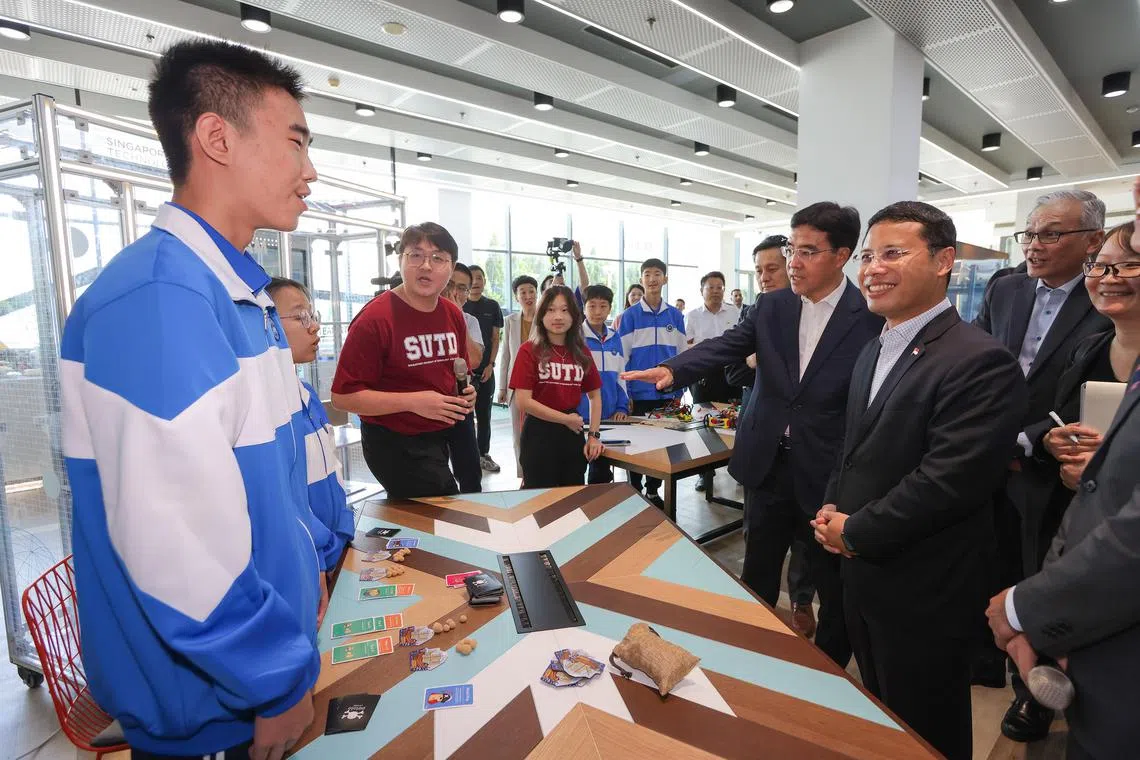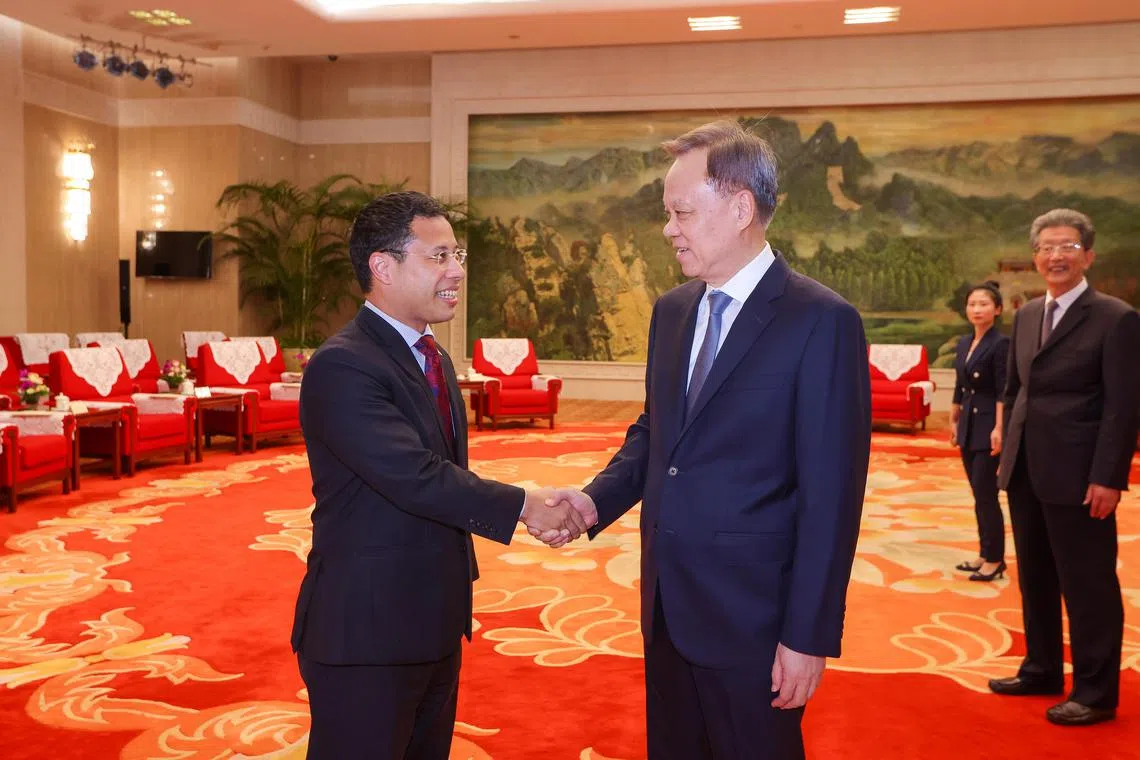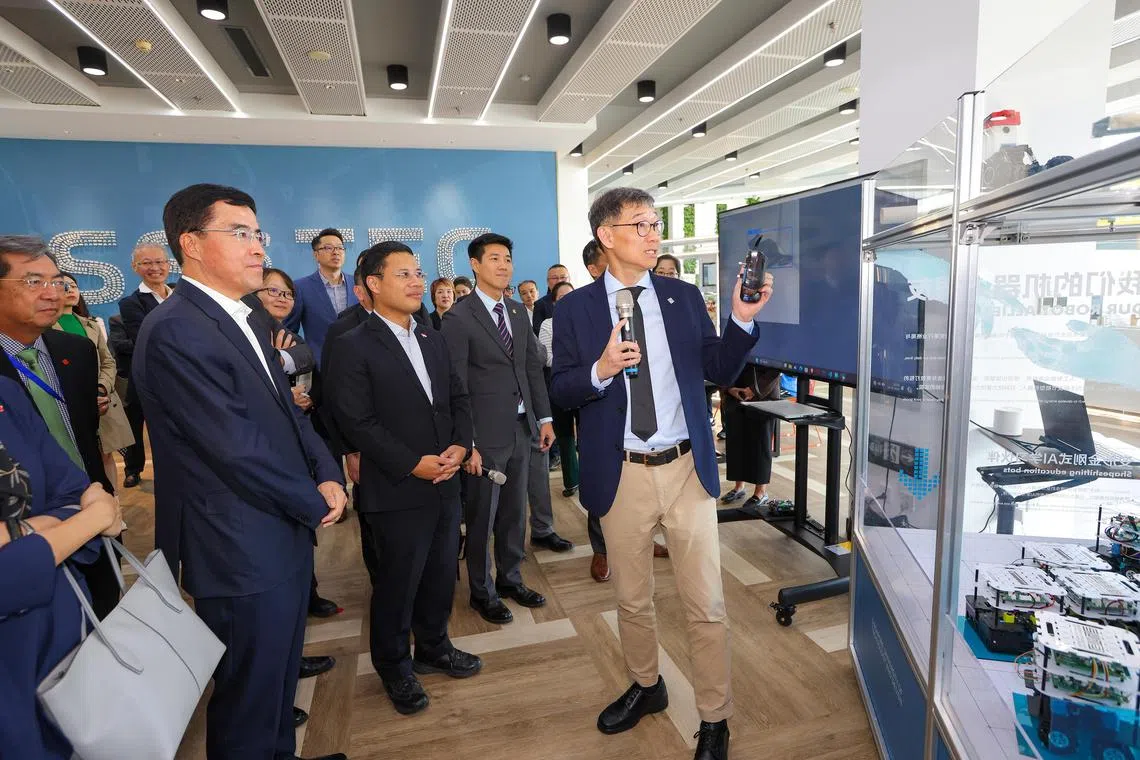China’s recent measures to support its economy a positive for S’pore companies: Desmond Lee
Sign up now: Get ST's newsletters delivered to your inbox

National Development Minister Desmond Lee interacting with students at SUTD's new research and innovation centre in Tianjin.
PHOTO: MND
Follow topic:
TIANJIN – China’s flurry of measures announced this week to boost its economy is a positive sign for Singapore firms interested in China, said National Development Minister Desmond Lee.
Speaking to reporters on Sept 27 as he wrapped up his visit to China, Mr Lee said the signal that China is determined to reinvigorate its growth was clear to the Singapore business delegates on the trip.
“There are many Singapore companies and SMEs (small and medium-sized enterprises) that work in China, work with China and trade with China, so this is good for us as well,” said Mr Lee, noting Singapore is an open economy which trades with everyone, from the Americans and Europeans to the Chinese and Indians.
China’s financial regulators had on Sept 24 unveiled a broad monetary stimulus package
Mr Lee is in Beijing and Tianjin from Sept 24 to 28 to co-chair the Singapore-Tianjin Economic and Trade Council (STETC) meeting, along with Tianjin Mayor Zhang Gong.
Mr Lee is accompanied by Senior Minister of State for Foreign Affairs and National Development Sim Ann.
Also on the trip is a business delegation of more than 50 representatives from 30 Singapore companies and organisations, which is larger than the delegation of 30 people with Mr Lee during his Tianjin visit in 2023.
On the afternoon of Sept 27, Mr Lee called on Tianjin party secretary Chen Min’er, in what was their third meeting since Mr Chen took up the Tianjin post in end-2022.

National Development Minister Desmond Lee (left) meeting Tianjin party secretary Chen Min’er in Tianjin on Sept 27.
PHOTO: MND
Mr Lee, who is also Minister-in-charge of Social Services Integration, had earlier met Chinese Minister of Housing and Urban-Rural Development Ni Hong in Beijing on Sept 25.
He said they discussed how businesses and technologies can support urban renewal given an ageing population.
At the 10th STETC meeting held on the morning of Sept 27, the first after Singapore and China upgraded bilateral relations in 2023, Mr Lee said the Tianjin Eco-City project is making good progress as an incubator for green enterprises from both countries.
During the trip, Mr Lee also officiated at the launch of several facilities.
One of these is a smart manufacturing park, located in Tianjin Eco-City’s northern district, where a 61,400 sq m site will provide the space for smart manufacturing businesses looking to set up operations in the eco-city.
Singapore-based manufacturer Feasurge is among the first batch of three companies setting up in the park.
Its founder and chief executive Song Guanhua told The Straits Times that he took a year to visit various industrial parks in China before finally deciding on the one in Tianjin to start its factory, which will employ about 30 people to manufacture plant-based materials.
“The plant-based materials that we make can be used in many industries to help realise their zero-carbon vision, such as electric cars and sustainable construction materials. So it’s important to be close to many enterprises for potential business opportunities, and Tianjin Eco-City offers that, on top of a favourable business environment,” he said.
According to the Tianjin Municipal Bureau of Commerce, Singapore has set up 1,165 foreign-invested enterprises in Tianjin, and ranks fifth overall with US$11.73 billion (S$15 billion) in foreign capital. There are about 14,000 foreign enterprises in Tianjin.
In 2023, trade between Tianjin and Singapore hit 10.37 billion yuan (S$1.96 billion), up 47.9 per cent from 2022.
A total of nine memorandums of understanding were inked during Mr Lee’s trip to Tianjin, most of which were aimed at deepening government and business cooperation between Singapore and Tianjin in the areas of green solutions, low-carbon growth and trade ties.
Global asset manager and operator Keppel on Sept 27 hosted Mr Lee on a tour of its carbon-neutral smart residential precinct, which boasts a fitness corner similar to those in Singapore’s Housing Board estates and wireless phone charging spots on public benches powered by solar energy.
Meanwhile, Singapore autonomous driving tech company MooVita has partnered a Chinese transport company to deploy five of its driverless buses in the eco-city’s public bus network, plying a 20km-long road cutting through tourist, commercial and residential spots. The company’s China headquarters is in the Tianjin Eco-City.
MooVita’s chief executive Derrick Loh said: “The driving behaviour in China is very different from that in Singapore. For instance, there are a lot of electric scooters in China – so the software has to adapt to the Chinese way of driving. There’s also the issue of weather; where there’s heavy snow, the bus goes very slowly, maybe 10km per hour – so it’s more complicated.”
Launched in 2008, Tianjin Eco-City is the second government-to-government project between Singapore and China and now houses more than 150,000 residents, up from just 10,000 in 2012.
The Tianjin Eco-City project was mooted by Singapore’s then Senior Minister Goh Chok Tong and then Chinese Premier Wen Jiabao in 2007, against the backdrop of rapid urbanisation in China, as well as global attention on sustainable development.
Before the development of the eco-city, the site was mainly salt pans, barren land and polluted water bodies, including a wastewater pond.
The project, now in its 16th year, has met its initial goal of building a sustainable and liveable city, said Mr Lee.
The next phase is moving from sustainable urban development to being a leading green, low-carbon economic and innovation hub.
One project to be scaled from prototype to product in Tianjin Eco-City and beyond is a smart robot that inspects false ceilings for structural defects and signs of degradation, a job typically done manually.
The robot comes under a 600 sq m research and innovation centre unveiled by the Singapore University of Technology and Design (SUTD) on Sept 27.
The centre will carry out collaborative projects between Singapore and Tianjin on sustainable and low-carbon technologies and foster talent exchanges between SUTD and universities in Tianjin.

SUTD President Phoon Kok Kwang (right) presenting a smart robot that inspects ceilings to National Development Minister Desmond Lee and his delegation at the SUTD Eco-City Research and Innovation Centre in Tianjin, which was launched on Sept 27.
PHOTO: MND
SUTD president Phoon Kok Kwang told ST that he sees the research centre as a platform to scale innovations such as the smart robot to market in China, using Tianjin as a launch pad.
He said: “Having all these projects is good, but where will you get the next project?
“Ultimately, you want to use a research centre like ours to nurture talent because talent is what will sustain the development. So the longer-term plan has to be on nurturing talent.”


